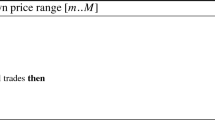Abstract
In this paper, we study a multiple time series search problem in which at the first n periods, one product is produced in each period and becomes sellable. The total length of the trading horizon N (\(N>n\)), i.e., the total number of trading periods (which includes the first n periods when the products are produced), is unknown beforehand. All the n products are homogeneous. At each period, a price is observed and the player must decide immediately the number of available products to sell at this period, without the knowledge of future prices and when the trading horizon ends. The objective is to maximize the total revenue from selling the n products. We present an online algorithm ON for this problem and prove its competitive ratio. A lower bound on the competitive ratio for this online problem is also proved. Numerical results for the theoretical competitive ratio of algorithm ON and the lower bound are also reported.
Similar content being viewed by others
References
Chen GH, Kao MY, Lyuu YD, Wong HK (2001) Optimal buy-and-hold strategies for financial markets with bounded daily returns. SIAM J Comput 31(2):447–459
Chin FYL, Fu B, Guo J et al (2015) Competitive algorithms for unbounded one-way trading. Theor Comput Sci 607:35–48
Copil K, Worbelauer M, Meyr H, Tempelmeier H (2017) Simultaneous lotsizing and scheduling problems: a classification and review of models. OR Spectr 39:1–64
Damaschke P, Ha PH, Tsigas P (2009) Online search with time-varying price bounds. Algorithmica 55:619–642
Drexl A, Kimms A (1997) Lot sizing and scheduling—survey and extensions. Eur J Oper Res 99(2):221–235
El-Yaniv R, Fiat A, Karp RM, Turpin G (2001) Optimal search and one-way trading online algorithms. Algorithmica 30(1):101–139
Fujiwara H, Iwama K, Sekiguchi Y (2011) Average-case competitive analyses for one-way trading. J Comb Optim 21:83–107
Fung SPY (2019) Optimal online two-way trading with bounded number of transactions. Algorithmica 81:4238–4257
Hasegawa S, Itoh T (2018) Optimal online algorithms for the multi-objective time series search problem. Theor Comput Sci 718:58–66
Lorenz J, Panagiotou K, Steger A (2009) Optimal algorithms for \(k\)-search with application in option pricing. Algorithmica 55:311–328
Manasse M, McGeoch LA, Sleator D (1988) Competitive algorithms for on-line problems. In: Proceedings of 20th annual ACM symposium on theory of computing. ACM, New York, pp 322–333
Mohr E, Ahmad I, Schmidt G (2014) Online algorithms for conversion problems: a survey. Surv Oper Res Manag Sci 19(2):87–104
Savage LJ (1951) The theory of statistical decision. J Am Stat Assoc 46(253):55–67
Schmidt G (2017) Competitive analysis of bi-directional non-preemptive conversion. J Combin Optim 34(4):1096–1113
Schroeder P, Dochow R, Schmidt G (2018) Optimal solutions for the online time series search and one-way trading problem with interrelated prices and a profit function. Comput Ind Eng 119:465–471
Schroeder P, Kacem I (2020) Optimal solutions for online conversion problems with interrelated prices. Int J Oper Res 1–26
Schroeder P, Kacem I, Schmidt G (2019) Optimal online algorithms for the portfolio selection problem, bi-directional trading and -search with interrelated prices. RAIRO Oper Res 53:559–576
Sleator DD, Tarjan RE (1985) Amortized efficiency of list update and paging rules. Commun ACM 28:202–208
Tiedemann M, Ide J, Schöbel A (2015) Competitive analysis for multi-objective online algorithms. In: Rahman MS, Tomita E (eds) WALCOM: algorithms and computation. WALCOM 2015. Lecture notes in computer science, vol 8973. Springer, Cham, pp 210–221
Wang W, Wang L, Lan Y, Zhang JX (2016) Competitive difference analysis of the one-way trading problem with limited information. Eur J Oper Res 252(3):879–887
Xu Y, Zhang W, Zheng F (2011) Optimal algorithms for the online time series search problem. Theor Comput Sci 412(3):192–197
Zhang Y, Chin FYL, Lau FCM et al (2018) Constant competitive algorithms for unbounded one-way trading under monotone hazard rate. Math Found Comput 1(4):383–392
Zhang W, Xu Y, Zheng F, Dong Y (2012) Optimal algorithms for online time series search and one-way trading with interrelated prices. J Comb Optim 23(2):159–166
Zhang W, Xu Y, Zheng F, Dong Y (2012) Online algorithms for the multiple time series search problem. Comput Oper Res 39(5):929–938
Zhang W, Xu Y, Zheng F, Liu M (2011) Online algorithms for the general \(k\)-search problem. Inf Process Lett 111(14):678–682
Zhang W, Zhang E, Zheng F (2015) Online (J, K)-search problem and its competitive analysis. Theor Comput Sci 593:139–145
Zhang W, Zhang E, Zheng F (2016) Online two stage \(k\)-search problem and its competitive analysis. Int J Found Comput Sci 27(6):653–663
Acknowledgements
The authors are grateful to the two anonymous referees for their valuable comments and suggestions.
Funding
This work was partially supported by the Natural Science Basic Research Program of Shaanxi Province (Program No. 2021 JM-317), the National Natural Science Foundation of China under Grant No. 11771346, and the Major Projects of National Natural Science Foundation of China under Grant No. 72192834.
Author information
Authors and Affiliations
Corresponding author
Ethics declarations
Conflict of interest
The authors have no conflicts of interest to declare that are relevant to the content of this article.
Availability of data and materials
Data sharing not applicable to this article as no datasets were generated or analysed during the current study.
Code availability
Not applicable.
Ethics approval
Not applicable.
Consent to participate
Not applicable.
Consent for publication
Not applicable.
Additional information
Publisher's Note
Springer Nature remains neutral with regard to jurisdictional claims in published maps and institutional affiliations.
Rights and permissions
About this article
Cite this article
Zhang, W., Zhang, Y., Cheng, Y. et al. An online trading problem with an increasing number of available products. J Comb Optim 44, 518–531 (2022). https://doi.org/10.1007/s10878-021-00841-y
Accepted:
Published:
Issue Date:
DOI: https://doi.org/10.1007/s10878-021-00841-y




